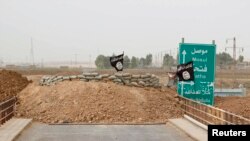Kurdish militias in northern Syria continued to clash with Islamic State militants on Monday as coalition forces capped off their first week of airstrikes with fresh attacks on militant positions in Syria and Iraq.
U.S. jets and drones, along with Arab-allied planes, hit a staging area near a Syrian grain storage site, officials said Monday, one of 11 targets hit as part of the effort to rollback Islamic State battlefield victories.
The Britain-based Syrian Observatory for Human Rights reported civilian casualties in the attack on the grain silo near the town of Manbij. Coalition forces appeared to also hit Islamic State targets in Aleppo, Raqqa, Hassakeh and Deir el-Zour provinces, the group said.
U.S. Central Command said in a statement that among the Islamic State sites and equipment Sunday and Monday was an armed vehicle, an anti-aircraft artillery transport vehicle and an airfield in northwest Syria near Aleppo.
The Manbij attack targeted a training camp and vehicles within a staging area adjacent to a grain silo that was controlled by Islamic State, it said.
Col. Patrick Ryder, a spokesman for Central Command, told Reuters that military officials had no evidence to corroborate the allegations of civilian casualties in the Manbij attack.
In Iraq, airstrikes hit two vehicles near Kirkuk and another two near Sinjar destroyed two armed vehicles, the military said.
Coalition Airstrikes
The airstrikes Sunday and Monday were the latest in nearly a week of daily attacks in Syria, and followed similar strikes that began last month in Iraq. They are part of the effort to stem the tide of the extremist militants from the Islamic State, who control vast territory in Iraq and Syria.
The U.S.-led coalition includes Saudi Arabia, Bahrain, the United Arab Emirates, Qatar and Jordan. Several European countries are also contributing in targeting sites in Iraq, including France, the Netherlands, Denmark, Belgium and Britain.
More raids Monday struck the town of Tel Abyad on the Syria-Turkey border, The Associated Press reported. Mehmet Ozer, who lives on the Turkish side of the border told AP that the raids hit an empty school and an abandoned military base Islamic State fighters cleared out of the base about four months ago, he said.
Human Rights Watch said Sunday it had confirmed the deaths of at least seven civilians from apparent U.S. missile strikes on Sept. 23 in the village of Kafr Derian in Idlib province. Two men were also killed in the strikes, but that they may have been militants, the U.S.-based group said.
Rise of Islamic State
The Islamic State, a Sunni militant group which broke off from al-Qaida, alarmed the West and the Middle East after sweeping through northern Iraq in June, slaughtering prisoners and ordering Shiites and non-Muslims to convert or die.
Not only is it battling Shiite-backed governments in Iraq and Syria, the Islamic State is fighting other Sunni groups in both countries, part of a complex multisided civil war in which nearly every country in the Middle East has a stake.
The head of Syria's al-Qaida branch, the Al-Nusra Front, which has also been targeted by U.S. strikes, said Islamists would carry out attacks on the West in retaliation for the campaign.
“Muslims will not watch while their sons are bombed. Your leaders will not be the only ones who would pay the price of the war. You will pay the heaviest price,” Abu Mohamad al-Golani said in an audio message posted on pro-Nusra forums.
The air war has failed to halt an advance by fighters on the Kurdish town of Kobani in northern Syria. This past week's battles near the town, also known as also known as Ain al-Arab, has sent 140,000 people fleeing over the border in Turkey.
Reuters reported that Turkish tanks and armored vehicles took up positions on hills overlooking Kobani on Monday as shelling by Islamic State insurgents intensified and stray fire hit Turkish soil.
Turkey's Reaction
At Mursitpinar, a border crossing near Kobani, scores of young men were returning to Syria, many saying they would join the fight.
Turkey, which has tried to walk a fine line in responding to the crisis, has not permitted its own Kurds to cross to join the battle, only Syrians.
Meanwhile, Turkey's government said Monday it was moving forward to get parliamentary approval to join the coalition against the Islamic State militants, Agence France-Presse reported.
Obama TV Interview
President Barack Obama said that the United States underestimated the rise of the Islamic State and other Syria-based militants, and overestimated Iraq's ability to fight them.
In an interviewed aired Sunday on the CBS TV news program 60 Minutes, Obama said it was a myth that Syria would fine today if the United States had armed the moderate rebels two years ago, as some in Washington had urged.
Obama blamed the situation in Iraq, in part, on former Prime Minister Nouri al-Maliki, saying he squandered an opportunity to unify the country and was more interested in consolidating Shiite support than putting together a unity government.
Obama also said that young men who only think about whether they are Sunnis or Shiites should instead be concerned about getting an education and a good job.
Material from Reuters, AFP and AP was used in this report.






